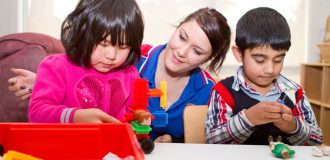14 SepThe Role of Technology in Childcare and Early Learning
 Childcare operators and educators can no longer afford to ignore the benefits of technology in early learning. Not only do the traditional methods of teaching and administration waste time and money, but quality of care is sacrificed and opportunities are lost when the focus is on paperwork, and not the primary role of education.
Childcare operators and educators can no longer afford to ignore the benefits of technology in early learning. Not only do the traditional methods of teaching and administration waste time and money, but quality of care is sacrificed and opportunities are lost when the focus is on paperwork, and not the primary role of education.
Technology use within the childcare industry remains at universally low levels, as revealed in the 2017 IBISWorld Industry Report, yet the regulatory demands to embrace digital continue to rise. ‘Romantic’ approaches to education and learning also miss the opportunity to leverage from the unique possibilities opened up by integrating modern technology in the early learning and teaching experience.
Every job in every industry requires administrative tasks, that’s a given. But very few industries have had such dramatic changes to regulations in recent years as early learning, following the introduction of the National Quality Framework for Early Childhood Education and Care. These changes to childcare operations across Australia have brought about higher minimum qualifications for childhood educators, and increased staffing numbers to meet new educator-to-child ratios. While improved quality of care is a positive for children and their families, these changes do mean increased demands and greater workloads for childcare operators and educators, including more paperwork.
Greater Workflow Efficiency
Specialized childcare software can save significant time and operational costs by automating regulatory tasks and mandatory reporting requirements. Administrative tasks such as collecting, paying and requesting payments, creating and reviewing occupancy reports, monitoring profits and losses, managing staff and rosters, and even connecting with parents and other educators in a real-time virtual chat environment are possible with the new platforms. This means spending fewer hours on the tasks you have to do, and more time doing what you love.
Improved Child Learning and Development
We are no longer living in a world where it’s practical to disregard or avoid ‘screen time.’ Children of today are being born into the digital era, and they need to be prepared for the digital life that lay ahead for them – whether that be web-based study, online shopping, or chatting virtually with family and friends. At a recent early childhood learning conference in Darwin, exposure to digital technology was described as ‘essential for child development’.
Experts there said technology could benefit a child’s learning experience provided the content was appropriate. US academic Dr Chip Donahue acknowledged not all teachers and parents supported early technology uptake, but urged educators not to ‘stand still’.
“These are tools of the children’s world, these are tools of their culture, these are tools that will be critical for their school readiness and success, we don’t have a choice to say ‘we choose not to’.”
Communication and Connection with Families
To succeed in our digital information age, childcare professionals of today need access to technology that supports their work processes, offers online learning and professional development opportunities, and provides the ability to connect and network with parents, staff and other professional peers. Ultimately, childcare software isn’t just intended to make jobs easier, but to provide improved learning and development outcomes for children in care. And that is something we can all agree on.
__________________________________________________________________________________________________________________________________________________________________________________
Author: Mark Woodland
Mark Woodlan d is the founder & CEO of Xplor, a multi-platform childcare software system for the education sector. He founded Xplor 2015, after working in his mother’s Melbourne childcare centre and serving in the Australian Army. While working in his mum’s childcare centre, he was frustrated with the outdated systems and level of admin. He took a “very small problem” and came up with a very big solution to revolutionise the childcare sector. Woodland went on to open two more early learning centres in Melbourne. Mark is included in KPMG’s top 20 Australian Twitter power list. You can follow him here @MarkAWoodland
d is the founder & CEO of Xplor, a multi-platform childcare software system for the education sector. He founded Xplor 2015, after working in his mother’s Melbourne childcare centre and serving in the Australian Army. While working in his mum’s childcare centre, he was frustrated with the outdated systems and level of admin. He took a “very small problem” and came up with a very big solution to revolutionise the childcare sector. Woodland went on to open two more early learning centres in Melbourne. Mark is included in KPMG’s top 20 Australian Twitter power list. You can follow him here @MarkAWoodland



